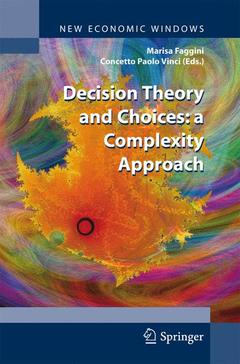Decision Theory and Choices: a Complexity Approach, Softcover reprint of the original 1st ed. 2010 New Economic Windows Series
Langue : Anglais
Coordonnateurs : Faggini Marisa, Vinci Concetto Paolo

In economics agents are assumed to choose on the basis of rational calculations aimed at the maximization of their pleasure or profit. Formally, agents are said to manifest transitive and consistent preferences in attempting to maximize their utility in the presence of several constraints. They operate according to the choice imperative: given a set of alternatives, choose the best. This imperative works well in a static and simplistic framework, but it may fail or vary when 'the best' is changing continuously. This approach has been questioned by a descriptive approach that springing from the complexity theory tries to give a scientific basis to the way in which individuals really choose, showing that those models of human nature is routinely falsified by experiments since people are neither selfish nor rational. Thus inductive rules of thumb are usually implemented in order to make decisions in the presence of incomplete and heterogeneous information sets.
General Issues.- Coherence, Complexity and Creativity: the Dynamics of Decision Making.- Complexity Theoretic Bounded Rationality and Satisficing.- Optimisation and “Thoughtful Conjecturing” as Principles of Analytical Guidance in Social Decision Making.- Agent Based Models.- A New Agent-based Tool to Build Artificial Worlds.- Exploration Modes and Its Impact on Industry Profitability.- Financial Fragility and Interacting Units: an Exercise.- Techniques and Tools.- Using Homogeneous Groupings in Portfolio Management.- Elman Nets for Credit Risk Assessment.- Modeling from Physics.- From Chemical Kinetics to Models of Acquisition of Information: On the Importance of the Rate of Acquisition of Information.- Thermodynamic-like Approach to Complexity of the Financial Market (in the Light of the Present Financial Crises).- A Physicist’s Approach to Phase Controlling Chaotic Economic Models.- Related Issues.- A Note on Complaints and Deprivation.- Predictability of SOC Systems. Technological Extreme Events.- Ontology Based Risk Management.
The papers collected in this volume show that economic agents, individual or aggregate, do not conform to standard economic models How a different framework - complexity theory - could help to explain and understand the choice and decision process of economic agent A descriptive approach that springing from the complexity theory tries to give a scientific basis to the way in which individuals really choose Includes supplementary material: sn.pub/extras
Date de parution : 08-2016
Ouvrage de 251 p.
15.5x23.5 cm
Date de parution : 08-2010
Ouvrage de 251 p.
Disponible chez l'éditeur (délai d'approvisionnement : 15 jours).
Prix indicatif 158,24 €
Ajouter au panierThèmes de Decision Theory and Choices: a Complexity Approach :
Mots-clés :
Alternative; Complexity; Economic agent; Satisficing; decision theory; optimization
© 2024 LAVOISIER S.A.S.



